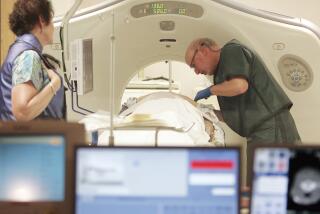Blue Cross May OK Tests to Find Illnesses Early
- Share via
WASHINGTON — The nation’s largest private health insurer recommended Tuesday that routine medical screenings for cancer, heart disease and other illnesses be covered under its policies.
The Blue Cross and Blue Shield Assn. said the new benefit, if adopted by member plans, would raise monthly premiums by $3 for individuals and $7.50 for families.
Physicians said the added costs are outweighed by the advantage of early detection and treatment.
Association officers said they will recommend that member plans offer the benefit package to their 73 million subscribers, about 40% of whom already have some preventive coverage.
Among the procedures that would be covered are mammograms, Pap smears and tests for cholesterol and blood in the stool.
“We believe this will set the standard for the health insurance industry to give millions of Americans peace of mind and healthier lives,” said Bernard Tresnowski, president of the Blue Cross and Blue Shield Assn.
“It’s a great beginning,” said J. Michael McGinnis, deputy assistant secretary for health at the Department of Health and Human Services.
“What we’re seeing here is a paradigm shift. There is a growing recognition in government, in the professions and in the private sector that preventive services need to be in the fore of medical encounters,” he said.
The screening package include tests for breast, colon, cervical and lung cancer; heart disease; hypertension; diabetes, thyroid disease and osteoporosis. The guidelines recommend frequency of tests and identify the population that should be tested.
But, although diseases in their early stages are easier and less expensive to treat than diseases that have progressed, more widespread screening will add new health care costs, some health care professionals said. In addition to the cost of the screenings themselves, the tests will detect more disease that will require treatment. This will lengthen lives, meaning more people will need access to health care.
“On balance, this benefit will increase health care costs,” said Dr. David Eddy, professor of health policy management at Duke University. On a nationwide basis, the cost of disease screening and follow-up treatment “will exceed the expected savings from treatment” of disease in later stages.
The screening guidelines were drafted by Blue Cross and Blue Shield and the American College of Physicians, the nation’s largest medical specialty organization.
More to Read
Sign up for Essential California
The most important California stories and recommendations in your inbox every morning.
You may occasionally receive promotional content from the Los Angeles Times.













